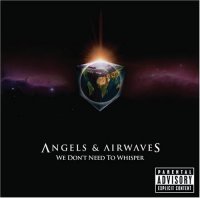Though many are loathe to admit it, Blink-182 is one of those great gateway bands; the one that invited so many people to discover punk and hardcore; even if the first song you heard was "All the Small Things," by now, you might be listening to nothing but Orchid and Defiance, Ohio. Yes, it has been that long. The result is that the split of Blink-182 is one that came with an inordinate amount of attention, just because so many punk fans would sheepishly admit that Blink-182 got them into it.
The products of band splits are always interesting, not just because of the innate drama that comes with it, but because of how it reveals a little more about the original band and the songwriting dynamic that influenced it. Take At the Drive-In; the resulting two bands, Sparta and the Mars Volta took two decidedly different directions, with Sparta focused on shorter, more traditional arrangements and the Mars Volta taking an unrestrained foray into prog. While fans split into separate camps over the results, it becomes clear that Cedric and Omar were the force behind the band's most experimental moments, while Jim grounded the band in reality leading to the now beloved dynamic of the At the Drive-In.
With Angels & Airwaves and Plus-44 coming out of Blink-182, the main songwriting duo of Tom and Mark split. Though Plus-44 has only one track publically available, one could speculate about the dynamic of those two songwriters on Blink-182, an album that had the band experimenting with ambitious song structures and mixing up everything with more dance-oriented drumming. It seems pretty clear that Tom Delonge was aiming high, while Mark kept the album tight and loose.
With Angels & Airwaves, Tom Delonge has certainly taken the route of the ambitious songwriter, sometimes leading to great moments, but often unrestrained and overlong. The first single, "The Adventure" was Blink-182 by way of U2's Unforgettable Fire, replete with the overlapping and delayed guitar chops that could only have been inherited from the Edge; it's still a great song, and one of the standouts of the album. Even the opener, "Valkyrie Missile" has a terrific song somewhere, but it's sadly buried in an overlong two-minute intro.
Another track, "Little's Enough" maintains an artificially slow tempo; the hook is pure Enema of the State, but it feels like it's standing at the edge of a familiar drumbeat, one which never actually appears. "War" is another Blink-182 song, and a good one -- it's just too long. That is a recurring problem; unlike the efficiency of great songs like "Anthem" or "Carousel, " so many of the songs aren't allowed to work on their own merit but become buried in lengthy introductions and overproduction.
It's a little unfortunate to have to criticize this album, because Blink-182 was such a wonderful maturation for the band and one that understood that complexity does not always equal progress. The Ramones were great because they could do so much with so little, and Blink-182 were certainly students of this mentality. The extra production and instrumentation that comes with Whisper often obscure gems of songwriting rather than highlight them.
In the end, the problem with We Don't Need to Whisper is not one of ambition; Tom wants to write the Cure's Disintegration and U2's Joshua Tree, but needs a creative foil to keep his songwriting economical.
Even on Cheshire Cat, you could hear this musician's ability to write an incredibly tight, no-nonsense post-NOFX pop/punk song, and Tom still can -- he just needs a friend to tell him to tone it down once in awhile.
